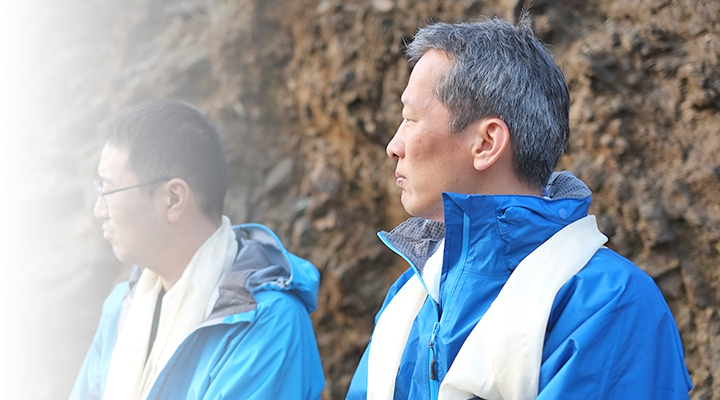
INTERVIEW
Researching economic models in public policy and social
infrastructure productivity
Disadvantaged areas
are not necessarily remote
areas; rather,
they are within our mind.
Social Implementation Course
Graduate School of Humanities and Social Sciences
Prof. Yuichiro Yoshida
Researching economic models in public policy and social
infrastructure productivity
Starting with transportation and attempting to discover universal laws
Prof. Yoshida specializes in transportation economics and applied econometrics.
“All sciences have a common root, and I find it interesting to see how these all interconnect in unexpected ways,” explains Prof. Yoshida before going on to share why he chose a career as a scientist.
“My studies at Keio began when I was a junior high school student, and something my mentor told me about the spirit of Keio has always stuck with me.” He goes on to share that it was the emphasis that Keio had traditionally placed on jitsugaku – “practical learning.”
“Jitsugaku is an abbreviation of the Japanese translation of “scientific positivism” which refers to an approach to learning in which one constantly assesses a subjective hypothesis critically and modestly, and continues to refine it through verification.”

Prof. Yoshida says that when he heard this, he felt that it would be possible to become a scientist even within the field of economics. He continues, explaining that there was one more thing that pushed him in this direction.
“There is something else that my mentor told me – that in order to make a living, you need to be humble and you need to have support. Then what he told me is that for scientists, that support is their own intellectual curiosity – that the one thing that keeps them going is a that sense of curiosity that keeps asking ‘why?’ and ‘how?’ When I heard this I thought it sounded pretty cool, so I made up my mind to become a scientist.”
Prof. Yoshida says that this is why he now approaches research as a scientist; understanding economics from a broader, positivist perspective.
Prof. Yoshida explains that “economics is not just about money these days and is actually becoming a discipline that considers human behavior in its entirety.” He says that this is the starting point from which he seeks to derive universal and intrinsic laws.
‘If universally valid laws do exist, we should be able to arrive at these no matter which direction we approach them from. So I figured that if this was the case, then I would start with transportation which is an area I enjoy.”
The goal Prof. Yoshida works towards is finding himself in a situation in which he can say “I came at this from a transportation perspective, but now I’ve managed to solve this other problem, and now we know this, we can solve all the problems of developing countries!” He validates his enthusiasm by reiterating that “all sciences have a common root.” Prof. Yoshida grins and speaks in a joking tone, but the expression in his eyes is completely serious.
Contributing to growth in developing nations through analysis of development policies from an economics perspective
Prof. Yoshida has always approached research into the public and development policies needed to promote growth in developing nations from an economics perspective, and continues to do so today as he oversees the Taoyaka program’s Economic Development and Policy class.
“Taking an economic perspective means understanding things in terms of three elements: the current state, the ideal, and the policies that bridge the two. Developing countries are currently facing a wide variety of issues in the same way that Japan once did. Although at first glance these problems may each appear to be different, they often have the same essential composition. What’s more, we can classify these problems into various types of market economy failures according to that composition. We can then analyze developing nations, taking into consideration the unique background of each country, and through this develop extremely fine-tuned policies for problem solving and development. In other words, we can write a unique prescription for development in each country.”
In his classes, Prof. Yoshida teaches this kind of classification and analysis while looking at a wide variety of economic development policies. As the majority of the class is made up of international students from all over the world, classes include discussions and presentations through which international students are able to share their own awareness of issues in development.

There is currently one student in the Taoyaka program studying under Prof. Yoshida and he is carrying out comparative analysis of service standards before and after the privatization of JR, one of Japan’s major railway companies, for his thesis.
“For example, he’s currently using a timetable from 1982 and spending hours upon hours extracting data about what time trains left each station heading towards Tokyo on the Tokaido line, what time they arrived, and how much waiting time there was between transfers during a 24-hour period. This is really tedious work but he’s undertaking it extremely diligently,” says Prof. Yoshida.
What students need to ask themselves before going “on-site”

Despite his passion for development, Prof. Yoshida takes a unique approach to the “disadvantaged areas” that are the fields of study in the Taoyaka program.
“Disadvantaged areas are not just the areas in South Asia and the semi-mountainous and island areas of Chugoku and Shikoku that the Taoyaka program focusses on. These areas can be found anywhere in the world and in fact, I would say that disadvantaged areas also do exist in our mind.”
Prof. Yoshida says that this way of thinking also makes sense in relation to the research into JR mentioned above.
“Electric power services are to be fully liberalized as of April, and regulatory reforms like this are always implemented in order to foster the structural reform of economic society. Up until liberalization happens there is no competition, and in many cases, service standards remain low. Still, many people are unaware of this and therefore continue to use expensive power services. In this sense, we can conclude that we all have ‘disadvantaged areas’ in our mind,” says Prof. Yoshida in a determined tone.

Prof. Yoshida wants students to not only gain whatever they can from on-site learning, but to also deepen their awareness of this aspect of ‘disadvantage’ during their time on campus.
He encourages his students, saying he wants students “to equip themselves thoroughly so that they will be able to discover prescriptions for problem resolution, through which they will then be able to somehow improve the situation in developing nations, no matter how small an improvement that may be.”
Disadvantaged areas are not necessarily remote areas; rather,
they are within our mind.
![]()
Yuichiro Yoshida Professor
International Economic Development Program, Division of Humanities and Social Sciences, Graduate School of Humanities and Social Sciences
April 1, 2020 – Professor, Graduate School of Humanities and Social Sciences
April 1, 2013 – March 31, 2020 Professor, Graduate School for International Development
April 1, 2006 – March 31, 2013 Associate Professor, National Graduate Institute for Policy
April 1, 2005 – March 31, 2006 Assistant Professor, National Graduate Institute for Policy
September 1, 2001 – March 31, 2005 Lecturer, International University of Japan





